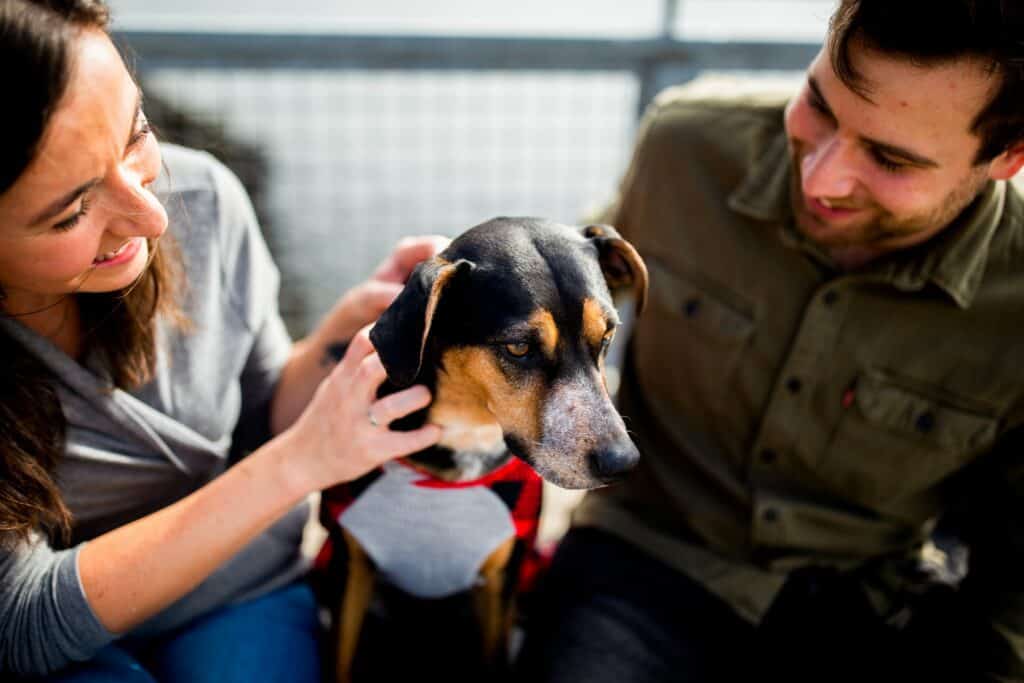- Your Dog Ate Chicken Bones, What To Do? Here Are 5 Important Steps To Follow - July 15, 2022
- How To Stop Dog From Licking Paws – Break The Habit! (Top Causes & Easy Solutions) - February 8, 2022
- 7 Best Fresh Dog Food Delivery Services - December 12, 2019
You’re probably familiar with the popular children’s song, “How Much is that Doggy in the Window?”
It’s a little jingle that goes, “How much is that doggy in the window? The one with the waggly tail? How much is that doggy in the window? I do hope that doggy‘s for sale!”
Buying or adopting a dog may seem that simple at the outset, but complications and situations can arise in your life and Fido’s that could call into question your legal ownership of your beloved dog, or even necessitate your ability to prove legal ownership.
Animal Law is Even More Complex than Human Law in Some Ways!
In some cases, your ability to do so could be the difference between keeping Fido by your side, or losing him forever. Some of these situations might include:
- Fido gets lost and is found by another family–who isn’t so enthusiastic about returning him to you.
- Fido gets lost and is found by an animal shelter, humane society or similar organization.
- Someone claims to have received a dog bite, witnessed dog attacks, or says that your dog lunged at, or otherwise behaved aggressively, and the injured person calls animal control officers or other local authorities attempt to remove him from your home.
- You and your partner decide to part ways–and you both want Fido to go your way.
So When is a Dog Legally Yours?
In most of these cases, there are a few basic steps you as a dog owner will want to have taken before you and Fido might ever find yourselves in one of these situations, including:
- Properly licensing Fido according to your locality’s requirements
- Microchipping Fido and/or making sure Fido wears a collar with up-to-date tags that include his name, your name, your contact information, up-to-date rabies vaccination information
- Keeping updated copies of Fido’s vaccinations in your car glove box, as well as in a file at home
- Keeping an updated photograph of you and Fido together in your car glove box, as well as in a file at home.
Recovering Your Lost Pet
Animals go missing for many reasons, and most pet owners never find out what happened to their beloved fur child.
If you’re fortunate enough to be in the minority of pet owners that are able to locate their dog after he has gone missing, you may still have some hurdles to clear before he can come home.
Chances are, Fido ended up with either a private party, such as a neighbor or other good Samaritan, who found him and has cared for him in the meantime, or in an animal shelter with the humane society.
Let’s discuss each scenario…
Your Lost Pet Is With a Private Party

In the case of a private party having found and being unwilling to return the dog to the dog owners, the court first must determine if it believes you violated any animal cruelty laws, abandoned, mislaid, or lost your dog.
Were you following the leash law in your area? If the court deems you to have abandoned your pet, you lose all ownership rights.
However, if the pet is determined to have been mislaid or lost, you have a better chance of becoming reunited.
The term “mislaid” means you unintentionally left your dog in a specific location.
The owner of the location where you left your dog has superior rights to everyone’s but yours–so you are likely to be able to retrieve your dog. The term “lost” refers to your never having intended to leave your dog anywhere in the first place.
To help understand the difference between the two terms, consider these examples: You may have “mislaid” your dog if you brought him and his three canine friends to the off-leash dog park, and then came home with only his three friends, not realizing you were short one dog, who you inadvertently left at the dog park.
You may have “lost” your dog if he dug out of the backyard without your realizing it, or jumped out of your car and made a break for it as soon as you pulled into the parking lot at the off-leash dog park.
In the case of a lost dog, you, as the true dog owner, still hold property rights superior to those of the person who found your dog.
In both cases, the original pet owners typically maintain the right to your dog, as long as you can prove he does, indeed, belong with you, and you have found him in a reasonable amount of time.
According to the legal experts at Skaug Law, pets are considered property under common law, and you can easily achieve the return of your pet if you can prove original, legal ownership, also called true ownership.
Keep in mind, though, that after a few months (the time period may vary by location), you forfeit your original ownership rights, which are then granted to the person who found your dog, as long as that person reported your pet lost and did not just assume ownership without giving you a chance to find and reclaim Rover.
Proving Your Pet is Yours
Let’s assume you’ve been fortunate enough to find Fido, and he has been safe and sound all this time in some caring person’s home.
How do you go about proving he’s really yours? What determines ownership of a dog? Several precedents have been set for determining a dog’s true owner.
These include:
- A description of your dog’s behavior. Perhaps there is a special trick that Rufus performs if you issue a specific command. Perhaps Bingo loves women but is terrified of men. Perhaps Clifford hates squeaky toys but is obsessed with tennis balls.
- A description of identifying marks or scars your dog has. Maybe you can describe a scar Studley bears on his left front knee from a surgery–bonus if you have the vet records to verify the surgery. Maybe you can explain the mole Fido has on the inside of his back right leg, or the missing tooth he had extracted last spring.
- Your dog’s favorable response to his original name. In other words, when you call Fido, “Fido,” he immediately reacts, despite his pseudo family’s having called him “Chance” since they found him.
- DNA tests from hair found on a grooming brush.
- An ability to prove you have owned Fido for a long time, such as photographs of the two of you together, dated vet records and receipts with your name as the payee, etc.
- If you have a service animal or emotional support animal, you will have paperwork with information about the dog that you can use to prove that he or she is your domestic animal. Your service dog will have innate behaviors and indicators to help prove this point, while an emotional support animal may not. Keep all your paperwork handy.
Your Lost Pet is at an Animal Shelter

If a shelter is holding your dog, it must do so for a certain amount of time (which varies by location but may be as short as two days) while it tries to find and notify you of your pet’s location.
If the shelter has not found you before the allotted time elapses, it is legally authorized to sell, adopt out, or even euthanize your pet. An adoptive pet parent may get immediate ownership rights, making your reunion with your dog very difficult, if not impossible.
For this reason, it is imperative that you notify all nearby animal shelters and contact your local animal control if your dog ever goes missing—as well as regularly check-in to see if he is at any of these local shelters.
In addition, there are steps you can take as a dog owner before your dog ever goes missing to help ensure that should he find himself at the pound, you will be able to get him back home.
Proper identification is one of the most important elements of keeping Rufus safe should he ever become impounded. You can show them a picture of you and your dog wearing his favorite leather dog collar as proof that you are the owner.
You can also make a customized dog tag with your contact information in case your dog gets lost or impounded. Proper identification can include:
- tattoos
- microchips
- collars
- tags or licenses
In many states, proper identification means your dog will get an extended holding period at an animal shelter before the shelter can legally dispose of him, whether through adoption or through euthanasia (which is not the case with stray dogs).
This will give you more time to locate him, as well as give the shelter more time to locate you. In addition, the American Veterinary Medical Association has found that microchipped dogs are reunited with their owners at a rate of 52.2%, whereas dogs who are not microchipped are returned at less than half that rate–21.9%.
Dangerous Dog Allegations

If someone reports to the local authorities, animal control or law enforcement that your dog has bitten, lunged at, or otherwise behaved aggressively toward them, you may be faced with a circumstance wherein animal control officers knock at your door, requiring you to relinquish Rover to their care due to the allegations against him.
If your pet has been labeled a dangerous dog, and you find yourself in this situation, it’s important to take advantage of your Fourth Amendment rights.
Although the local authorities may make it seem as though you do not have a choice in the matter, the Fourth Amendment grants you the right to resist unwarranted search and seizure.
Since the government considers your dog your property, you are not required by law to allow an official to seize your animals from your home without a warrant or court order.
If you do relinquish your dog to law enforcement at your door without demanding to see the court order or warrant, you essentially waive your ownership rights, decreasing your chances of getting Rover back home, a goal that will likely require a legal battle for custody.
Your Dog and Divorce

While you and your partner likely consider your dog a member of the family–your fur baby–the legal system sees him simply as property.
More so than the emotional attachments the two of you have formed with your dog, the court will consider proof of ownership from the pet owners to determine which one of you will maintain legal ownership rights over Rufus.
When is a dog legally yours in a divorce? In most cases, a judge will look at the following to determine who keeps Rufus:
- License and Registration. Most, if not all, jurisdictions require you to register your dog when you first welcome him into your home. One of the weightiest documents in a canine custody case will be this initial registration, which will include the name of the person who paid the registration fees and registered the pet–this person now being one step closer to becoming the sole legal dog owner once the divorce is finalized.
- Veterinary Records. Vet records may also be used to help determine which one of you is more deserving of Rufus’s continued companionship. At your first visit to the vet, you were likely asked to supply your name as the owner. If only one of you offered your name, that person will typically be considered the dog owner, and is one step closer to winning custody of Rufus. If you both gave your names as a couple, a judge will likely try to determine which one of you was financially responsible for most of the veterinary care.
- Microchip Records. If only one of your names is included on the microchip record, that person is a little bit closer to becoming Rufus’s legal owner.
- Pedigree Registries. If your dog is a purebred registered with the American Kennel Club or similar organization, whichever one of your names appear on the registry can be granted legal ownership. However, just as with veterinary records and microchip records, both of your names may appear.
Any of these four documents may help determine which of you should be granted custody, providing only one of your names appears on the documents.
Ambiguities can arise, however, when, for example, both of your names appear on some or all documents, or one of your names appears on some documents, while the other’s name appears on other documents.
In the case of these ambiguities, a pet custody case can operate under the same philosophy as a child custody case, asking the question: What is in the dog’s best interest?
To answer this question, a judge will consider which of you is most likely to provide the best life for your dog, attempting to answer questions such as:
- What kind of environment will each party provide for the dog? How will this impact the dog’s life?
- How much time does each party have to devote to the dog?
- Which party is more capable of paying for veterinary and other expenses related to the dog?
- Does either party have a history of violence, drug abuse, violating animal cruelty laws or incarceration?
- Can one party prove deeper involvement (walking, grooming, training, etc.) with the dog than the other party?
Where Bingo Belongs
As you can see, establishing yourself as Bingo’s legal owner from the beginning is very important in maintaining your legal ownership of him throughout his life.
Your companion animal is truly man’s best friend, and it would be a tragedy to lose him. Part of being a responsible dog parent includes establishing yourself as a legal, true owner by registering and licensing Bingo, keeping a file of his veterinary care records, and outfitting him with proper identification.
Taking these steps can help keep Bingo where he belongs–at home with you.
Continue reading:
When Is The Right Age To Bring Your Puppy Home? (Checklists)




